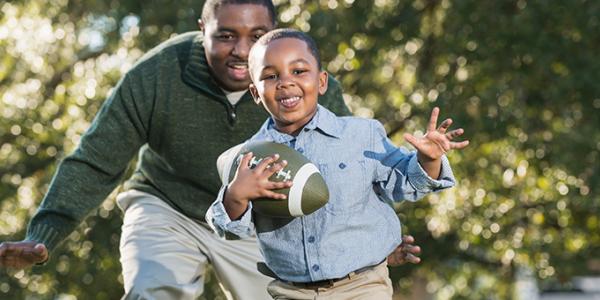Just Play with Me: What Research Tells Us About Playing More Confidently with Our Children

You are here
By: Alix Tonsgard and Nicole Rivera
Young learners enter this world driven to explore, experiment, learn, and grow. We see this in the toddler who delights in dumping a bin of blocks on the floor or in a curious infant splashing in a puddle. For early childhood professionals, there is no question that young children learn through play. Research has demonstrated that providing rich and varied play experiences for children boosts their early learning.
The DuPage Children’s Museum, located in the Chicago suburbs, is a constructivist informal learning environment that believes strongly in the power of play for supporting cognitive development. At this play-based institution, we are attuned to the fact that play is sometimes regarded as the work of children, and at other times it is considered less valuable than formal learning. We decided we wanted to gain insight into what parents and caregivers think about play.
In partnership with researchers from North Central College (in Naperville, IL), we worked to complete two studies to help us dive deeper.
Here’s some of what we learned about parents and play:
- Parents value play and believe it is highly important for their children’s cognitive development.
- Parents recognize play as an important way that young children learn about the world around them.
- Some parents don’t always feel confident about their own abilities to play.
- Busy schedules and concerns about safety can present barriers to play.
We get it—stepping outside of your comfort zone is not easy, switching gears to tune in to our playful side can be challenging, and understanding our role as the adult in play is not always clear.
Here are some things you can think about the next time you are prompted to get down on the floor with your little ones:
- Take time to watch and listen. Before joining your child’s play with your words or actions, take time to observe how your child is playing and experimenting. Not only will you delight in your child's discoveries, you will also find that observing is a great way to get to know your child's interests and gain an understanding about what he is learning. You may be surprised at how competent your child is when you focus on what he is doing.
- Say what you see. Instead of saying "good job," give your child specific feedback about what she did or what happened. Acknowledgement can be a gesture, a facial expression, or verbal feedback. Remember your child's discovery of what water can do? Here are some phrases you might say that show you notice your child's discoveries: "You did it!" "Wow, look at that! The water made the wheel turn!"
- Extend play. Offering other materials or modeling a new skill based on your child's interests is a way to initiate interaction and suggest additional possibilities, extending your child's learning while he continues to play. For instance, if your child were to build a ramp with blocks, you could offer him materials of different weights to roll down the ramp. “Does the heavier car go farther than the lighter car? Is one faster than the other? What else could we try?”
- Play and learn alongside your child. Our children are always watching us. When they see you making new discoveries, you are sharing a valuable lesson—that is, learning is a lifelong process.
While there is an art in knowing how best to support a child’s playful learning process, the most important things to remember are to relax, unplug, and have fun!
Alix Tonsgard, MS, is the Early Learning Specialist and DuPage Children’s Museum and a passionate advocate for play based learning.
Nicole Rivera, Ed.D., is an Associate Professor of Psychology at North Central College and serves as the DuPage Children's Museum's Academic Research and Evaluation Partner.